Bad news for horoscope readers! Astrology doesn’t work – and predictions based on the movement of the planets and stars are no better than random guesses, scientists say
Are you one of the millions of people who consult their horoscopes to find out what the future holds? Then scientists have some bad news for you.
Proponents of astrology claim that the movement of the stars and planets can influence and even predict the behavior and lives of people on Earth.
If this were true, skilled astrologers should be able to predict the position of the stars at the time of a person’s birth, or birth chart, based on information about that person alone.
However, an evaluation of 152 astrologers found that their answers to such tests were no more accurate than random guessing and that they almost always disagreed.
While nearly a third of American adults believe in astrology, this survey shows there is absolutely no evidence to support any of the discipline’s few testable claims.
Astrologers claim they can predict a person’s life and personality based on the alignment of the planets at the time of their birth. A new study has shown they are no better at making these judgments than someone who guesses randomly (stock image)
Many modern astrologers claim that a person’s birth chart—a tool that records the positions of the celestial bodies at the time of a person’s birth—can be used to predict aspects of a person’s personality and life.
To put astrology to a rigorous test, mathematician Spencer Greenberg joined forces with American social enterprise Clearer Thinking.
In a post on X, formerly Twitter, Mr. Greenberg explains: “One of the most fundamental claims of astrology is that a person’s birth chart contains information about that person’s life and character.
‘If that is true, astrologers should be able to correctly choose a person’s horoscope much faster than if they were to do so by random guesses.’
Greenberg consulted six astrologers to find out what information they needed about a person’s life in order to construct his birth chart.
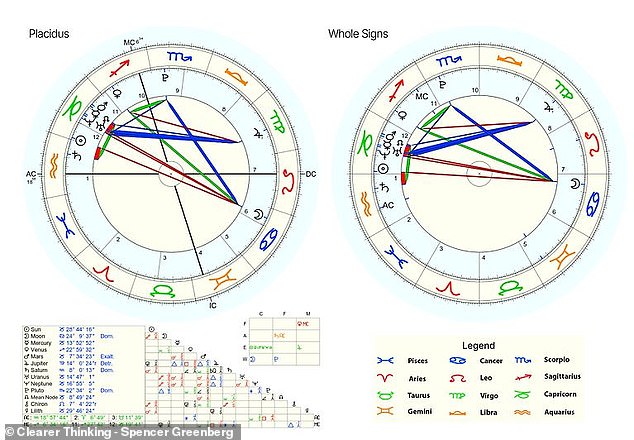
Researchers decided to test astrologers’ claims that birth charts (pictured) determine facts about a person’s life by asking them to match a description of a person to their corresponding birth chart.
With this information, the researchers created a questionnaire and selected 12 answers to serve as the basis for a test.
In the test, which you can try it yourself via this linkParticipants are given information about an unknown person and asked which of five possible birth charts corresponds to that person.
Mr. Greenberg said New scientist: ‘We wondered if we could set up a study where, if astrology works, there’s a good chance it will come out in astrology’s favor, and if it really doesn’t work, there’s a good chance it will come out in astrology’s favor.’
As an added incentive, anyone who answered 11 out of 12 questions correctly received a cash prize of $1,000 (£770).
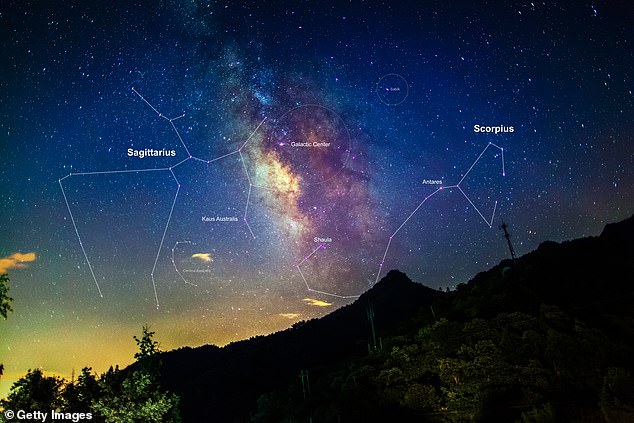
If astrology really worked, skilled astrologers should be able to match a person to their birth chart at a rate higher than chance. In this case, that would mean they would be right more than 20 percent of the time (stock photo)
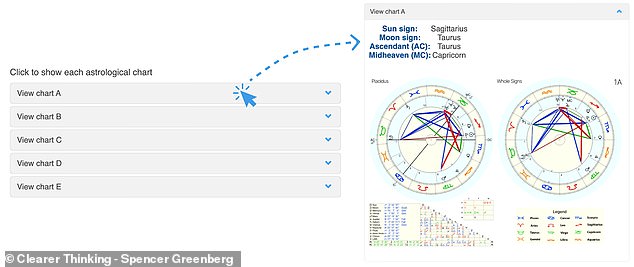
In the test (pictured), astrologers failed to answer the questions with greater than random accuracy, and they almost always disagreed with each other
Of the 152 astrologers who completed the test, more than half were confident they had six other answers correct.
However, on average, the astrologers got only 2.49 out of 12 possible answers right. That’s exactly what you’d expect if they were guessing randomly.
If astrology were wrong, you would expect most people to get about 20 percent of the answers right, a few more and a few less.
When you compare the distribution of expected outcomes of random gamblers with those of astrologers, you see that they match almost perfectly.
Mr. Greenberg says, “It’s indistinguishable from chance.”
Overall, no astrologer could answer more than five questions correctly, despite the majority believing that this was better than chance.
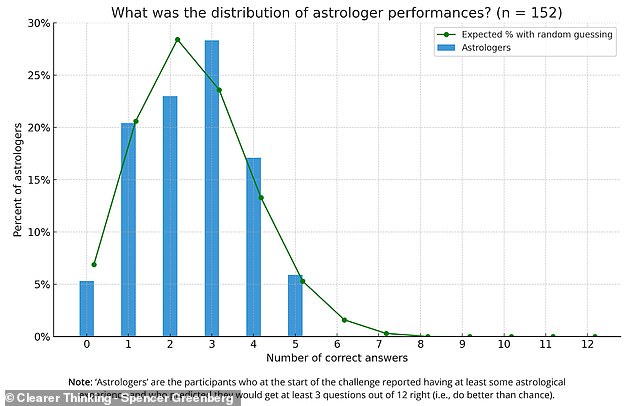
The distribution of astrologers’ correct test results (blue) matches almost exactly what you would expect if they were guessing randomly (green), suggesting that astrology isn’t real
Nor was it the case that less skilled or experienced astrologers predominated.
As part of the test, astrologers were asked to rate their experience on a scale from ‘I have some experience’ to ‘I am a world-class expert’.
But while the more experienced astrologers were more likely to predict that they would be right, there was no statistically significant difference between the groups.
In fact, on average, those who considered themselves world-class experts performed slightly worse than those who said they had little experience.
Importantly, the astrologers who did the test also had a very low level of agreement.
If astrology really involves scientifically observing details of the universe, then you would expect astrologers to give consistent answers to these kinds of tests.
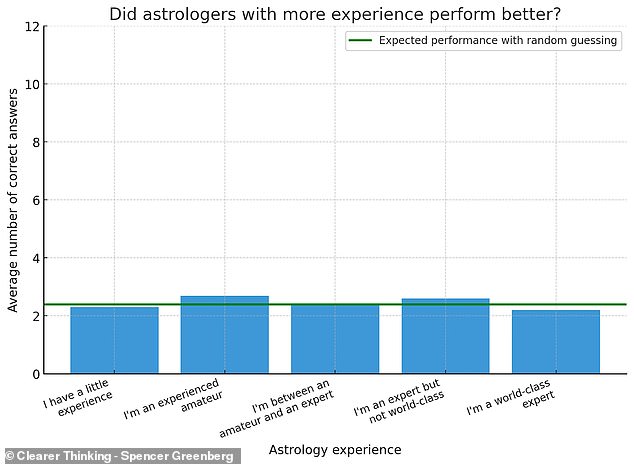
Astrologers ranging from those with very little experience to world-class experts were equally unsuccessful
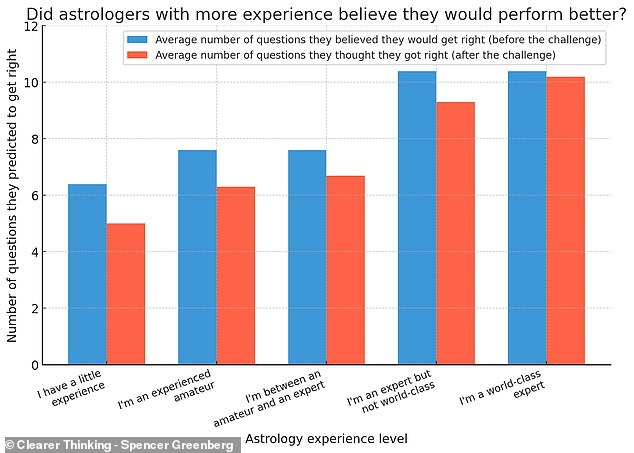
The only difference between the more and less experienced astrologers is that the more experienced participants had more confidence in their own abilities, both before (blue) and after (orange) the test.
However, the 152 astrologers who took the test rarely agreed with each other, and even the most experienced group gave the same answers only 28 percent of the time.
If all participants had guessed randomly, you would expect them to agree 20 percent of the time.
Mr. Greenberg says, “This was really surprising to me. It suggests that astrology may be less standardized than you might think.”
To many, astrology seems like a harmless distraction and hardly worth studying so intensively.
But Mr. Greenberg argues that this topic is as worth studying as any other.
Of X, Mr. Greenberg writes: ‘If astrology works, it will require a revolution in our scientific understanding of how the universe works, since modern physics provides no mechanism that could explain astrology.
‘But if astrology doesn’t work at all, then I think that’s also very important, because there is a lot of belief in astrology.
In 2022, the global value of the mystical services industry, which includes astrology, tarot cards and palmistry, was estimated at $2.2 billion (£1.69 billion).
Mr. Greenberg concludes: ‘Literally millions of people use it to better understand their lives, character, and future.
“If that doesn’t work, they’d better look for other sources of understanding and insight.”
